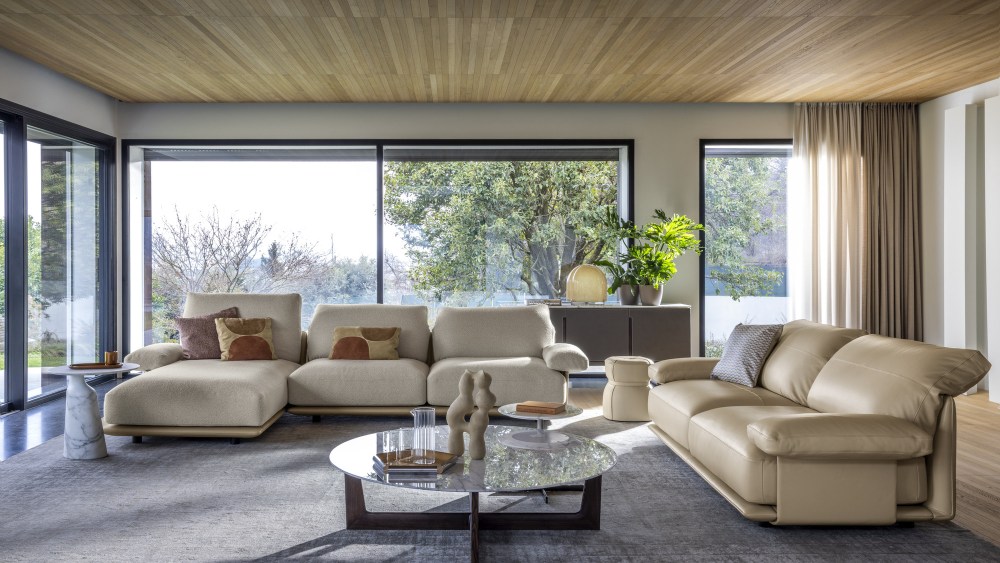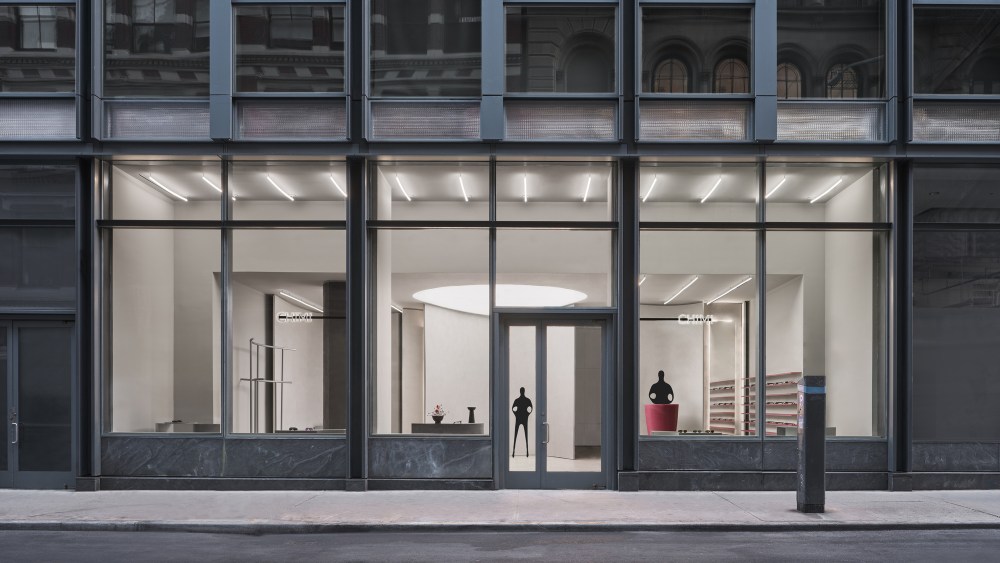MILAN — Design furniture and decor are performing better than luxury cars and fine art, but still lagging just the same. U.S. President Donald Trump’s Thursday decision to apply 20 percent tariffs on imports from Europe served up another blow to furniture and lighting firms here.
In 2024, the high-quality design furniture and homeware segment experienced a modest slowdown within the global luxury market, with projected declines of 2 percent at current exchange rates and 1 percent at constant rates compared to 2023, said Claudia D’Arpizio, senior partner and global head of fashion and luxury at Bain & Company.
“Despite this short-term dip, the category remains resilient in a broader context, showing a strong recovery of 20 to 22 percent versus pre-pandemic levels in 2019,” she said, adding that the category is trailing experience-driven sectors such as gourmet food and fine dining, luxury cruises, and private jets and yachts, all of which are seeing significant year-over-year growth.
You May Also Like
“This suggests that while consumers may be slightly pulling back on high-end home investments in the short term, the long-term appetite for well-crafted, design-led homeware remains robust, underscoring its importance as a foundational pillar of the luxury landscape,” D’Arpizio added, reflecting on 2025 as major design firms here gear up to showcase their latest collections at Salone del Mobile.Milano which kicks off Tuesday and runs until April 13.
In addition to a spending slowdown worldwide and a rocky housing market in Italy, the U.S. and China, Italian firms, which represent the backbone of the European design industry, are bracing themselves for Trump’s trade policy. On March 12, the U.S. placed a 25 percent tariffs on all imports of steel and aluminum-related products, including those from the European Union. On Wednesday, he took it a step further and hit the EU with a 20 percent tariff on all imports.

In a statement on Wednesday, Italian Prime Minister Giorgia Meloni said she was still working to prevent a trade war.
“The introduction of tariffs by the United States against the European Union is a measure that I consider wrong and that does not benefit any of the parties involved,” the premier’s office said in a statement.
Dario Rinero, CEO of furniture firm Haworth Lifestyle group echoed this. “I honestly think that it’s still open. It’s still under negotiation. He [Trump] finished the speech saying, in the case of Europe we still need to see,” Rinero said.
Regarding the wider Italian furniture market and Italy as a trade partner, Rinero thinks that the trade relationship with the U.S. had been a fair playing field. ”In our case…talking about reciprocity, we don’t have any duties, any tariffs in Europe for American furniture.”
ISTAT, Italy’s national statistics bureau, said last month that the country’s reliance on exports could spell trouble amid the trade war, despite warm relations between right-wing politicians Trump and Meloni.
“In recent years, in particular, Italy has oriented its export flows toward non-EU markets, especially the United States,” the report said, adding that 10 percent of all Italy’s exports were sold to the U.S. market, most of them machinery, pharmaceautcial products, cars, trucks and beverages.
Italy’s trade surplus with the U.S. reached about 35 billion euros in 2024, ISTAT said.
In 2024, turnover of Italy’s wood furnishing sector slipped 2.9 percent to 51.7 billion euros, dragged down by domestic sales, which represented more than 62 percent of the total. Exports fell 2.1 percent and account for 38 percent of all of Italy’s wood furnishing sales, according to Federlegno Arredo.
“It’s clear that, at the moment, Europe is definitely in a phase of slowdown, or at least not growing, with a few rare exceptions. The United States is a consolidated, stable market that still has a positive outlook, where the question mark about tariffs is an open issue,” said Salone del Mobile.Milano president Maria Porro.

“Our hope is that the worst-case scenario is avoided…in which both economies pay the price,” said Claudio Feltrin, president of FederlegnoArredo, the Italian federation of woodworking and furniture industries.
In 2024, Molteni Group bucked the trend, expecting to report a rise in revenue to 520 million euros from 470 million euros in 2023, as it opened new stores worldwide. Molteni Group planned 18 openings total for 2025, including Sao Paulo; Mumbai; Mexico City; Riyadh; Sydney; Auckland; Chengdu, and Bangkok. It opened two stores in Russia — one in Moscow and one in St. Petersburg — through a retail partner in 2024.
Despite the obstacles, Molteni Group chief executive officer Marco Piscitelli said that resilience is key. “As we all do, I hope the [Ukraine] war ends, not just from an economic point of view but for the view on war itself. Just like I hope that American duties are a temporary hurdle and that they don’t affect all the work that has been done [to grow] in our second market, that is the United States,” he said.

Boffi|DePadova CEO and president Roberto Gavazzi, who just cut the ribbon on the firm’s New York City flagship, said it books one third of its sales in the U.S. market. Earlier this year, he told WWD that, while tariffs are an inconvenience, he thinks his peers are well poised to weather the storm. “I think that the slightly higher end of the market will have an easier time defending itself from duties,” he said.
2025 Outlook
Poltrona Frau’s CEO Nicola Coropulis said the Tolentino-based firm also plans to open 18 stores in 2025. Bangkok and Kuala Lumpur opened in January, São Paulo in February and other cities are on the horizon like Sydney and San Francisco, with three new openings in India.
Coropulis said sales dipped slightly by a few single digits in 2024 following 2023, which was its best year ever. Looking ahead to 2025, January and February showed robust order intake especially of its contract business.
“What was really very dynamic was the contract business, and our custom interiors business unit with lots of prestigious projects,” he said.
Analysts at TD Cowen said that 2025 began slowly due to macroeconomic uncertainty, adverse weather, and declining consumer confidence, despite some positive indicators like increased tax refunds and lower mortgage rates.

Orbital Design Collective CEO Alexander Zschokke said 2025 performance was promising despite uncertainty. The group, which was acquired by the Alpha private equity fund in 2018, is home to upscale Italian furnishings brands Calligaris, and Ditre Italia and lighting brand Luceplan, in addition to newerv brands like Connubia and Fatboy. Fatboy, for example, which was acquired in 2021, was founded in 2002 in the Netherlands and was known for its signature oversize bean bag designed by Finnish interior architect Jukka Setälä.
“Geopolitical uncertainties and the lingering fear of a recession have dampened consumer confidence in purchasing durable goods and investing in their homes. Nevertheless, we’ve noticed a growing interest in the sector from emerging markets, which offers optimism for the future,” Zschokke said.
D’Arpizio is confident in the sector’s resilience overall, pegging growth at 5 to 7 percent between 2024 and 2030, reaching a market value of 65 billion to 75 billion euros by 2030, boosted by firms’ strong focus on experientiality, which is fueling the expansion of luxury projects, along with rising investments in high-end design that are helping to raise consumer awareness and expectations.
“Additionally, the growing brandization of luxury design is enhancing differentiation and brand value, while expansion into under-penetrated regions such as Asia Pacific, the Middle East, and the U.S. is accelerating market growth. These developments are underpinned by enduring structural trends, pointing to a sustained transformation of the luxury landscape,” she said.

Contract, Hospitality Are Key to Growth
Luxury European design firms are primed for growth in places like Riyadh, where contract business is on the rise as its hospitality industry booms. Molteni&C, BoffilDePadova and Giorgetti will all open later this year. Fendi Casa opened there in October, while Roche Bobois, a French family business, was a pioneer in the region, opening in 2007, and it now has stores in both Jeddah and Riyadh.
Overall, hospitality and contract business is booming worldwide, after being dormant throughout the entirety of the COVID-19 pandemic.
For Giorgetti, which said its revenues were stable in 2024 versus 2025, its hospitality and contract businesses are also expected to be main drivers in 2025.
“Contract at the moment is performing very well. We see significant growth in the hospitality world combined with the good performance of some historic customers in the retail world. I expect single digit growth in the Giorgetti B2C world for 2025 and I expect a slightly more marked growth for the B2B world.”




